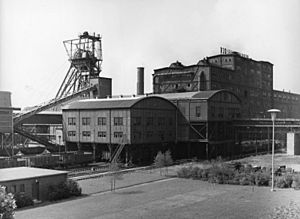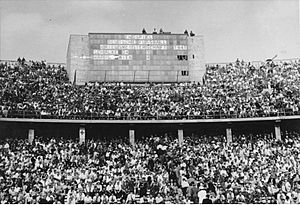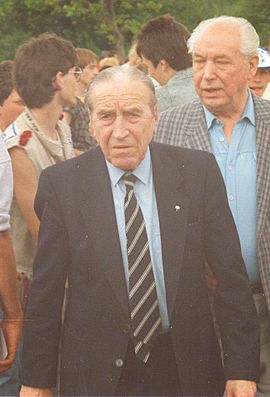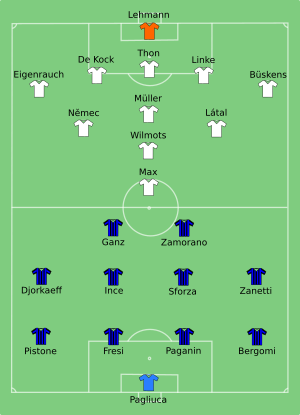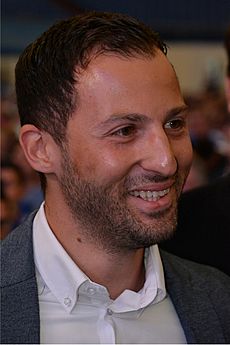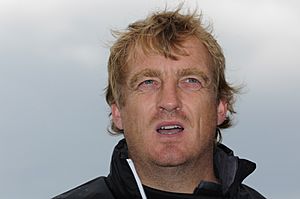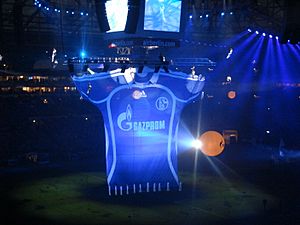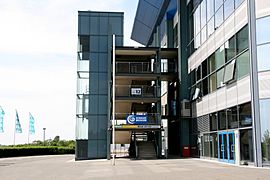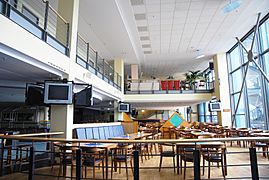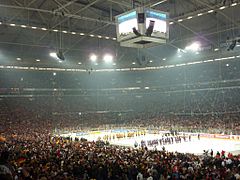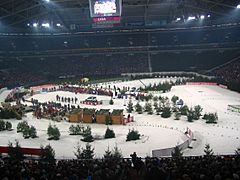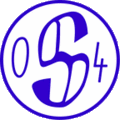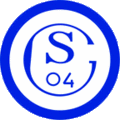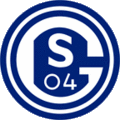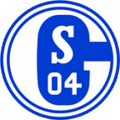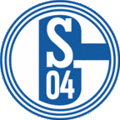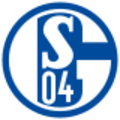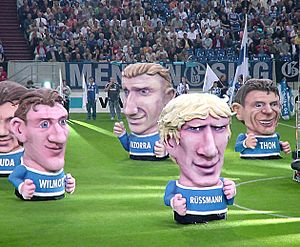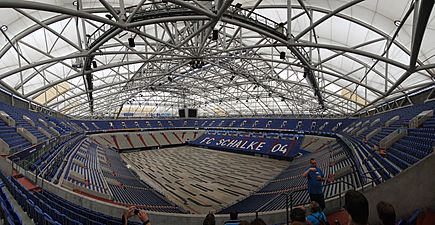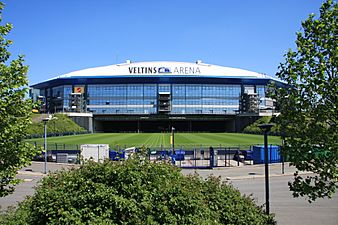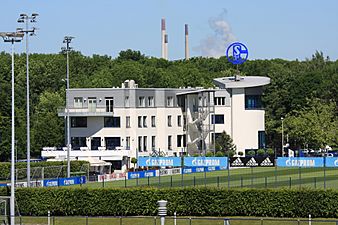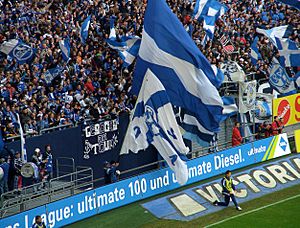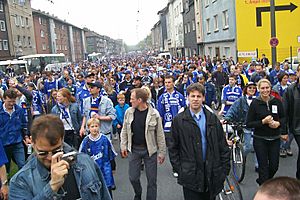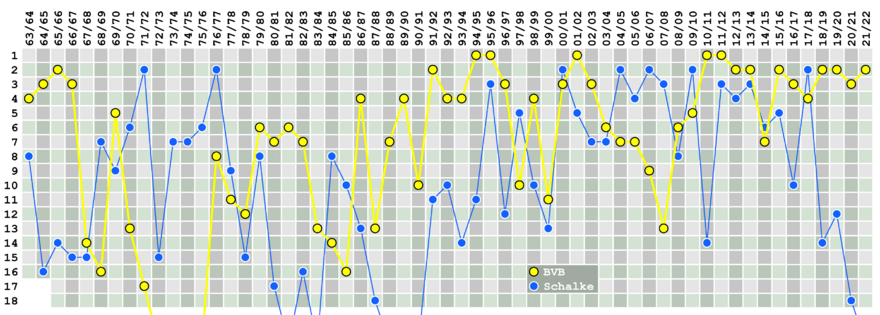FC Schalke 04 facts for kids
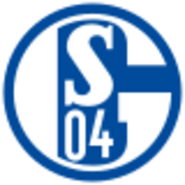 |
||||
| Full name | Fußballclub Gelsenkirchen-Schalke 04 e. V. | |||
|---|---|---|---|---|
| Nickname(s) | Die Königsblauen (The Royal Blues) Die Knappen (The Miners) |
|||
| Short name | S04 | |||
| Founded | 4 May 1904 as Westfalia Schalke |
|||
| Ground | Veltins-Arena, Gelsenkirchen | |||
| Capacity | 62,273 | |||
| CEO | Matthias Tillmann | |||
| Head coach | Miron Muslić | |||
| League | 2. Bundesliga | |||
| 2020–21 | Bundesliga, 18th of 18 (relegated) | |||
|
||||
Fußballclub Gelsenkirchen-Schalke 04 e. V., often called Schalke 04 or just S04, is a professional sports club from the Schalke area of Gelsenkirchen, Germany. It is most famous for its football team. The team currently plays in the 2. Bundesliga, which is the second-highest football league in Germany. They were moved down from the top league, the Bundesliga, in the 2022–23 season. Besides football, the club also has teams for athletics, basketball, handball, table tennis, winter sports, and eSports.
The "04" in the club's name comes from its founding year, 1904. Schalke has been one of Germany's most popular football teams, even though their most successful period was in the 1930s and 1940s. In 2023, the club had 178,000 members. This makes it the second-largest football club in Germany and the fourth-largest club in the world by membership.
Schalke has won seven German championships, five German Cups (DFB-Pokals), one League Cup (DFB Ligapokal), one Supercup (DFL-Supercup), one UEFA Cup, and two UEFA Intertoto Cups. In 1937, Schalke was the first German club to win both the league and the cup in the same season. Since 2001, Schalke's home stadium has been the Veltins-Arena. Schalke has a long-standing rivalry with their neighbors Borussia Dortmund, known as the Revierderby.
Contents
History of Schalke 04 Football Club
Schalke's Early Years: 1904–1927
The club started on May 4, 1904, as Westfalia Schalke. It was founded by a group of high school students and first wore red and yellow uniforms. For a while, they couldn't join the official football league and played in other local groups. In 1912, they joined a gymnastics club called Schalker Turnverein 1877 to get into the official league. This partnership lasted until 1915, when the football team became independent again as SV Westfalia Schalke.
They reunited with the gymnastics club in 1919, forming Turn- und Sportverein Schalke 1877. In 1923, the new club won its first title, becoming champions of the Schalke Kreisliga. Around this time, Schalke got its nickname Die Knappen, which means "The Miners" in an old German word. This was because many of their players and supporters worked in the coal mines of Gelsenkirchen.
In 1924, the football team separated from the gymnasts again. They took the name FC Schalke 04 and started wearing their famous blue and white uniforms. This is where their second nickname, Die Königsblauen (The Royal Blues), came from. The next year, the club became the best local team. They played with a special style using short, quick passes to move the ball, which became known as the Schalker Kreisel (spinning top). In 1927, this style helped them reach the top league, the Gauliga Ruhr, and then the national finals.
Rising to Success: 1928–1933
After their first successes, the club quickly became very popular, especially among working-class people. In 1928, they built a new stadium called the Glückauf-Kampfbahn. To show thanks to the city, they changed their name to FC Gelsenkirchen-Schalke 04. They won their first West German championship in 1929. However, the next year, they faced a ban for almost half a year because they paid players more than the league rules allowed.
Despite the ban, the team's popularity didn't drop. In their first game after the ban in June 1931, 70,000 fans came to watch them play against Fortuna Düsseldorf. The club's luck started to change in 1931. They reached the semi-finals of the 1932 German championship, losing 1–2 to Eintracht Frankfurt. The year after, in 1933, they made it to the final, but Fortuna Düsseldorf won 3–0.
Championship Years: 1933–1945
When German football was reorganized in 1933, Schalke was placed in the Gauliga Westfalen. This was one of 16 top divisions created to replace many smaller leagues. This period was Schalke's most successful decade. From 1933 to 1942, the club played in 14 out of 18 national finals. They appeared in ten German championship finals and eight German Cup (Tschammerpokal) finals. They also won their league in all eleven seasons.
The club never lost a home game in the Gauliga Westfalen during these 11 seasons and only lost six away games. They remained unbeaten in the 1935–36, 1936–37, 1937–38, 1938–39, 1940–41, and 1942–43 seasons, showing how dominant they were.
Schalke's first national title came in 1934 with a 2–1 win over 1. FC Nürnberg. The next year, 1935, they won again, beating VfB Stuttgart 6–4. They missed the 1936 final but played in the championship match every year for the next six years. They won in 1937, 1939, 1940, and 1942. Three of these finals were against Austrian teams that joined Germany's league after Austria became part of Germany in 1938.
Die Königsblauen also often reached the final of the Tschammerpokal (German Cup), but had less success there. They lost the first Tschammerpokal final 0–2 to 1. FC Nürnberg in 1935. They also lost in the 1936, 1941, and 1942 finals. Their only cup victory came in 1937 against Fortuna Düsseldorf.
Over twelve seasons, from 1933 to 1945, Schalke won 162 out of 189 Gauliga matches, drew 21, and lost only 6. During this time, they scored 924 goals and only let in 145. From 1935 to 1939, they did not lose a single league match.
Football After World War II: 1945–1959
As World War II ended, Schalke played only two matches in 1945. They started playing regularly again after the war and remained a strong team for a few years. They set a record in a national championship game with a 20–0 win against SpVgg Herten. However, Schalke's performance then declined, and they finished sixth in the new Oberliga West in 1947. Within two years, they dropped to 12th place.
It took Schalke until the mid-1950s to regain their strength. They finished third in a close race for the 1954 Oberliga West title. The next year, they played in the 1954–55 German Cup final, where they lost 2–3 to Karlsruher SC. The club's next, and so far last, German championship came in 1958 with a 3–0 victory over Hamburger SV. The club's strong fan base is also shown in a local church, St. Joseph, in Gelsenkirchen. It was renovated after the 1958 victory, and one of its stained-glass windows shows Aloysius Gonzaga with a football, wearing Schalke's colors.
Bundesliga and the Euro Fighters: 1960–2000
Schalke continued to play well, finishing in the top four several times before the Bundesliga was formed in 1963. The Bundesliga was West Germany's new professional league. Schalke was chosen as one of the 16 clubs to join this top league.
Their first years in the Bundesliga were tough. In 1964–65, they avoided being moved down to a lower league only because the league expanded to 18 teams. They often finished near the bottom of the league table. However, their performance greatly improved in 1971–72, when they finished second to Bayern Munich, after leading the league for much of the season. In the same season, Schalke won the German Cup for the second time.
Despite their better results, the club faced a big challenge. Some of the team's players and officials were accused of being involved in a widespread scandal in 1971. It was found that Schalke had deliberately lost a match against Arminia Bielefeld. As a result, several Schalke players were banned for a period, including three who regularly played for the West Germany national team.
Even though the bans were later shortened, the scandal had a big impact on what could have been one of Germany's best teams in the 1970s. In 1973, the club moved to the Parkstadion, a new stadium built for the 1974 FIFA World Cup, which could hold 70,000 fans. After the scandal, the club's performance was inconsistent. They managed another second-place finish in 1976–77, just one point behind champions Borussia Mönchengladbach.
In the early 1980s, Die Knappen faced difficulties and were moved down to the second division of the Bundesliga for the 1981–82 season. After being promoted, they were moved down again in 1983–84. They returned to the top league in 1984 but were moved down once more to the second division in 1988. They finally returned to the Bundesliga in the 1991–92 season and stayed in the top league until 2021.
The club won its first major trophy since the 1972 German Cup with a victory in the 1996–97 UEFA Cup final against Inter Milan, winning on penalties. Coached by Huub Stevens, the 1997 Schalke team earned the nickname "Euro Fighters," which fans still use today. Stevens, who was not well-known in Germany at the time, quickly became a favorite among Schalke supporters.
Stevens brought strict discipline, especially in defense. His motto, "Die Null muß stehen" (meaning "It has to read zero" in English), showed how important it was to him that his team didn't let in any goals. This phrase has even become a common saying in Germany.
Top-Table Success and European Semi-Finals: 2000–2019
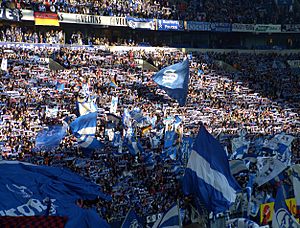
During the 1990s and early 2000s, the club changed into a modern sports organization and became one of the strongest teams in the Bundesliga. Schalke won the German Cup two years in a row, in 2000–01 and 2001–02. They also finished second in the Bundesliga in 2000–01, 2004–05, and 2006–07. The end of the 2000–01 season was very disappointing for Schalke fans. Bayern Munich scored a goal in the last minutes of their game against Hamburger SV, which took the title away from Die Königsblauen.
Schalke finished second in 2005, which meant they played in the UEFA Champions League again. They finished third in their group and then moved to the UEFA Cup. There, they were knocked out by Sevilla, who went on to win the competition. In 2005–06, Schalke finished fourth in the Bundesliga, and a year later, they were runners-up for the third time in seven seasons.
In the 2007–08 season, Schalke made it past the Champions League group stage for the first time. They reached the quarter-finals after beating Porto on penalties. They were then eliminated by Barcelona, losing both home and away matches 0–1.
On October 9, 2006, the Russian oil company Gazprom became the club's new main sponsor. The company said it planned to invest up to €125 million in the club over five and a half years. As part of this sponsorship, Schalke 04 and Zenit Saint Petersburg signed a "partnership agreement" to work together on football-related matters.
On April 13, 2008, the club announced that manager Mirko Slomka was dismissed after a big loss to Werder Bremen and being knocked out of the Champions League. Former players Mike Büskens and Youri Mulder took over as temporary coaches. For the 2008–09 Bundesliga season, Schalke hired a new head coach, Fred Rutten, from Twente. Rutten signed a contract until June 2010. In March 2009, Rutten was fired, and Mike Büskens, Youri Mulder, and Oliver Reck took charge again.
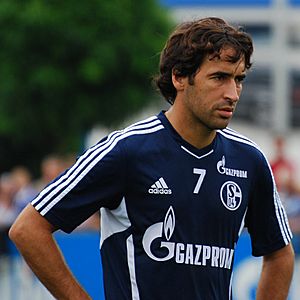
On July 1, 2009, Felix Magath, who had led VfL Wolfsburg to the top of the Bundesliga, became Schalke's head coach and general manager. Magath's arrival led to the club spending millions of euros to sign internationally known forwards Klaas-Jan Huntelaar and Raúl. Magath's time at the club started well, with the team scoring many goals. However, problems in defense and Magath's team choices made him unpopular with fans by December 2010.
On March 16, 2011, Magath was fired and replaced by Ralf Rangnick, who had briefly coached the team before, from 2004 to 2005. Just weeks after his appointment, Rangnick led Schalke to a 5–2 victory over Inter Milan in the Champions League quarter-finals. Schalke reached the semi-finals, where they lost to Manchester United. However, Schalke 04 managed to win the 2010–11 German Cup after beating MSV Duisburg 5–0. On June 1, 2011, Schalke's captain, Manuel Neuer, moved to Bayern Munich.
On September 22, 2011, Ralf Rangnick announced he was immediately stepping down as head coach due to long-term exhaustion. Assistant coach Seppo Eichkorn coached the team temporarily until Huub Stevens was appointed on September 27, 2011. Stevens' contract was set to run until June 30, 2013.
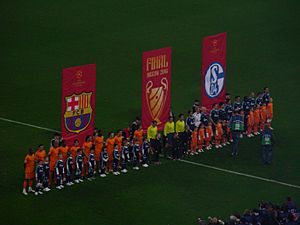
Even though Stevens was a favorite among Schalke fans, his return was met with some questions. Fans worried that Stevens, who had led Schalke to the 1997 UEFA Cup win with a very strong defensive style, might stop Rangnick's attacking play. However, these worries were not true. Although Schalke had an inconsistent season, they finished third in the Bundesliga, which meant they directly qualified for the UEFA Champions League.
Schalke had a great start to the 2012–13 Bundesliga season, reaching second place by November, just behind Bayern Munich. On October 20, Schalke traveled to Borussia Dortmund for matchday 8 and defeated them 2–1. This was their first league Revierderby win since February 2010. They secured a Champions League spot by finishing fourth. In the 2013–14 UEFA Champions League group stage, Schalke played against FCSB, FC Basel, and Chelsea. Schalke finished second in the group, behind Chelsea, and was eliminated in the round of 16 by Real Madrid CF.
A notable player who joined Schalke was Kevin-Prince Boateng from Milan. After a disappointing first half of the 2013–14 Bundesliga season, where Schalke was in seventh place and exited the German Cup early, the club had its most successful second half of a season in its history. The season was marked by many injuries to key players, like Jefferson Farfán and Klaas-Jan Huntelaar. This also led to discussions about head coach Jens Keller's performance. Schalke often played with up to ten young players from their youth system throughout the season. Among the most promising young players discovered in 2013–14 were Max Meyer and Leon Goretzka. The young Schalke team won 11 out of 17 matches, earning 36 points. At the end of the 2013–14 season, the club finished third in the Bundesliga, qualifying for their third straight UEFA Champions League appearance, a first for Schalke.
On October 7, 2014, after a 1–2 loss to 1899 Hoffenheim and only eight points from seven matches, Keller was fired and replaced by Roberto Di Matteo.
In the 2014–15 UEFA Champions League, Schalke 04 finished second in a group with Chelsea, Sporting CP, and Maribor. Later, they played against the defending champion Real Madrid again in the round of 16. They lost the first game at home 0–2 but won 4–3 at the Santiago Bernabéu Stadium. After finishing sixth in the 2014–15 season, the club announced that head coach Roberto Di Matteo had resigned on May 26, 2015. Schalke 04 then played in the Europa League in the 2015–16 and 2016–17 seasons, being eliminated by Shakhtar Donetsk and Ajax, respectively.
Starting with the 2017–18 season, Domenico Tedesco became the manager for Schalke 04. At the end of that season, he led the team to finish as runners-up to Bayern Munich. On July 29, 2018, the team's captain, Benedikt Höwedes, decided to leave after more than ten years at the club.
Financial Challenges and Recent Seasons: 2019–Present
In the 2018–19 UEFA Champions League, Schalke 04 lost 2–10 on total score to Manchester City in the round of 16. Two days later, on March 14, 2019, Tedesco was fired. Huub Stevens and Mike Büskens took over as temporary managers. On May 9, 2019, David Wagner was appointed as head coach of Schalke 04 with a three-year contract.
Schalke was greatly affected by the COVID-19 pandemic. In April 2020, the club stated it was at risk of bankruptcy. Because of high debt and less income due to pandemic restrictions, the club decided to set a player salary cap of €2.5 million per year.
In the second half of the 2019–20 season, Schalke set a new club record of 16 league games without a win between January 25 and June 27, 2020. Despite this losing streak, Wagner remained as manager. However, Clemens Tönnies stepped down from his role as chairman of Schalke's supervisory board after 19 years.
Schalke started the 2020–21 season with big problems. After losing 8–0 to Bayern Munich, 4–0 to RB Leipzig, and 1–3 at home against Werder Bremen, Schalke was last in the league table after three games. They had scored only one goal and let in fifteen. After just two match days, Schalke fired David Wagner as head coach on September 27, following the loss against Bremen. Wagner had the lowest average points per game for a Schalke head coach in recent history.
Three days later, Manuel Baum was named Wagner's replacement, with Naldo, a former Schalke player, as assistant coach. Baum, who took over when the team had an 18-game winless streak, could not win a single Bundesliga game between the 3rd and 12th match days. He was fired before the 13th match day against Arminia Bielefeld. Huub Stevens returned as head coach for his fourth time. Baum's time had extended the winless streak from 18 to 28 Bundesliga games, bringing Schalke close to breaking the all-time record of 31 winless games, set by SC Tasmania 1900 Berlin in the 1965–66 season. Stevens did not change Schalke's luck in his first game, losing the home game against Arminia Bielefeld 0–1.
On December 27, 2020, Schalke 04 announced they signed a contract with Swiss manager Christian Gross to be the head coach until the end of the season. This made him the fourth head coach for Schalke 04 during the 2020–21 season. Under Gross, Schalke's negative streak continued with a 3–0 loss to Hertha BSC, marking their 30th consecutive winless game, a streak of 358 days. On January 9, 2021, Schalke finally won a game against 1899 Hoffenheim, avoiding matching Tasmania Berlin's record. This remained Schalke's only victory under Gross, who was fired as head coach after just eleven matches on February 28, 2021, following losses against rival Borussia Dortmund (0–4) and VFB Stuttgart (1–5). Along with Gross, other staff members were also let go. Gross was the least successful head coach at Schalke since 1967.
On March 2, 2021, Dimitrios Grammozis was announced as the new head coach for Schalke 04. Grammozis started with a 0–0 draw against Mainz 05, but his team could not get any points in the next two matches, losing 5–0 against VfL Wolfsburg and 3–0 against Borussia Mönchengladbach. Schalke did not score a goal in the first three matches under Grammozis, which was a shared negative record for the club. Against Borussia Mönchengladbach, Schalke scored its fifth own goal of the season, another negative record.
Being moved down to the 2. Bundesliga was confirmed on April 20, 2021, when Schalke 04 lost 1–0 to Arminia Bielefeld.
On February 28, 2022, following Russia's actions in Ukraine, Schalke ended their contract with main sponsor Gazprom. This put more strain on the club's financial situation. Grammozis was fired as head coach on March 6, 2022, as promotion back to the Bundesliga seemed uncertain. He was replaced by Mike Büskens as temporary manager until the end of the season. Schalke improved under Büskens, winning eight of the remaining nine matches. The club secured promotion on May 7, 2022, after a 3–2 victory over FC St. Pauli that guaranteed a top-two finish in the 2. Bundesliga. Fans celebrated by running onto the pitch. One week later, Schalke won the 2. Bundesliga in an exciting way after a goal in the 88th minute by Simon Terodde, defeating 1. FC Nürnberg 2–1.
At the end of the 2021–22 season, Büskens moved back to his position as assistant coach. On June 7, 2022, Schalke appointed Frank Kramer as head coach. Because of the club's financial problems, most of the players who were important for their success in the previous season, like Ko Itakura, could not be kept. Schalke struggled to compete at the start of the 2022–23 Bundesliga season. After a series of losses, including a 1–5 against Hoffenheim, Kramer was relieved of his duties on October 19, 2022. At that time, Schalke was 17th in the Bundesliga after ten matchdays. Matthias Kreutzer took over as temporary manager. A week after Kramer's dismissal, on October 26, 2022, sporting director Rouven Schröder also resigned.
On October 27, 2022, Thomas Reis was named as Schalke's new head coach. The first match under Reis, against SC Freiburg, was lost 0–2. This was Schalke's seventh loss in a row. After the game, commentators noted the team's better organization compared to previous matches. Schalke finished the first half of the 2022–23 Bundesliga season in 18th and last place, with only nine points. After a 1–6 loss against RB Leipzig on match day 17, the club noticeably improved, especially in defense. Between match days 18 and 21, Schalke played 0–0 four times in a row, a new Bundesliga record. The following two matches were won, and on March 4, 2023, Schalke left the last place in the table for the first time since October 2022.
On March 11, 2023, in the 100th derby between Schalke and Borussia Dortmund, Schalke played 2–2 against Dortmund, who were in second place at the time. This ended Dortmund's streak of eight wins in a row. On the final match-day of the 2022–23 season, Schalke lost 4–2 against RB Leipzig. They finished 17th in the league table and were moved down again to the 2. Bundesliga.
After four defeats in the first seven games of the 2023–24 2. Bundesliga season, head coach Thomas Reis was fired on September 27, 2023. On October 8, 2023, Karel Geraerts was appointed as his replacement, with a contract until June 2025. Schalke finished the first half of the season in 14th position, three points above the relegation spots.
On January 3, 2024, Schalke appointed Marc Wilmots as sporting director, after firing Peter Knäbel. For Wilmots, who was one of the most famous former Schalke players, it was his first job as a director. On January 31, Sky reported that Schalke's financial situation might lead to the end of the club in its current form by the end of the season. If moved down from the 2. Bundesliga, Schalke might not get a license for the 3. Liga and would have to play in the Regionalliga West, the fourth division of German football. In that case, the current team and staff would have to leave the club for free. The club formally requested a license for the 3. Liga on March 15, 2024.
The second half of the 2023–24 season started with a series of defeats. The difficult sports situation was made worse by growing problems within the club, related to the relationship between Wilmots, Geraerts, and the team. After losing 3–0 against Magdeburg, Wilmots openly criticized both the team and head coach Geraerts. On match-day 24, Schalke achieved a surprising 3–1 victory against league leader St. Pauli, which was St. Pauli's first defeat of the season. Schalke followed up with a strong 3–3 draw against SC Paderborn. This, along with good individual performances from Yusuf Kabadayı and Ron Schallenberg, brought new hope that the club would avoid being moved down. The following week, after a 5–2 loss against Hertha BSC, Geraerts was criticized heavily again for his lineup and lack of tactical direction, while Wilmots confirmed that Geraerts's position as head coach was secure.
Sponsors and Finances
-
Ice hockey events are hosted at the S04 Veltins-Arena
-
Biathlon and a variety of winter sport events are hosted at the S04 Veltins-Arena
As of 2022, the main sponsor of Schalke 04 is the China-based electronics company Hisense. The Russia-based energy company Gazprom was no longer a sponsor from February 2022. Other sponsors include the insurance group ERGO Insurance Group, automotive manufacturer BMW, telecommunications company Huawei, sports betting company bet-at-home.com, Coca-Cola, brewery Veltins, and kit manufacturer Adidas.
In 2014, Schalke had an operating income of €13 million. In May 2019, the club was ranked by Forbes magazine as the 14th-richest football club in the world, valued at €683 million. However, as of 2022, the club is no longer in the top 20 for either income or value.
Schalke 04 was one of the Bundesliga teams most affected by the COVID-19 pandemic. In April 2020, the club stated it was at risk of bankruptcy.
In October 2024, Schalke signed a two-year sponsorship deal with Wildz.
In January 2024, Sky reported that Schalke's financial situation might lead to the end of the club in its current form by the end of the season. If they were to be moved down from the 2. Bundesliga, Schalke might not get a license for the 3. Liga. This would mean they would have to play in the Regionalliga West, which is the fourth division of German football. In that situation, the current team and staff would have to leave the club for free.
Club Crests
Players
Current Squad
|
|
Reserve Team
|
|
Famous Former Players
In the year 2000, fans voted for the Schalker Jahrhundertelf, which means the "Team of the Century":
|
|
Player Records
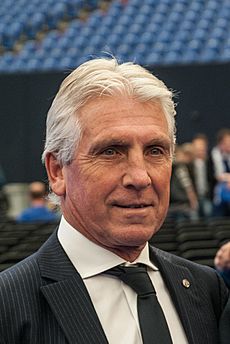
|
|
Stadium Information
Schalke's stadium is called the Veltins-Arena, named after a sponsorship deal with Veltins brewery. It was built in the summer of 2001 and can hold 62,271 spectators. Schalke often sells out its matches at this stadium, which is considered one of the most modern and best multi-use facilities in Europe. Before this, the stadium was known as the Arena AufSchalke. It replaced the Parkstadion, which was built in 1973 and had a capacity of 62,000. Before that, the club played its matches at the Glückauf-Kampfbahn, built in 1928 with a capacity of 35,000. The Glückauf-Kampfbahn was later used for amateur matches with a smaller capacity of 11,000. It is still used by the club for special events, like introducing new players and coaches.
Fan Culture
The number of members of Schalke 04 grew from 10,000 in 1991 to 160,000 in 2022. This makes Schalke 04 the second-largest sports club in Germany and the fourth-largest in the world, after Bayern Munich, Benfica, and CA Boca Juniors. As of 2022, Schalke is ranked as the 94th-best football club in Europe by UEFA's club rankings. In 2014, about 20% of Schalke 04 members were female, and 14% were under ten years old. Around 30% of the members were not from North Rhine-Westphalia. Besides Gelsenkirchen and nearby towns, many members come from cities like Cologne (1,117) and Berlin (932).
On August 21, 2013, Schalke 04 played their first home match of the 2013–14 season, a UEFA Champions League qualifier at the Veltins-Arena against the Greek team PAOK. The match ended in a 1–1 draw. The game was overshadowed by a police operation in the "S04 Ultras Gelsenkirchen" section of the stadium, which resulted in nearly 80 home fans being injured. Schalke won the return match 3–2, but their supporters were not allowed to attend.
Fan Club Association
The Schalke 04 Fan Club Association (SFCV) is a large group that represents about 1,500 fan clubs. In October 2012, about 200 of these fan clubs were in the Ruhr region, 360 in the rest of North Rhine-Westphalia, and 300 in other German states. A member of the SFCV board has a permanent seat on the board of FC Schalke 04. In 2013, the SFCV joined with the "Ultras Gelsenkirchen" and later with the supporters' club, Schalke Fan-Initiative eV.
Club Friendships
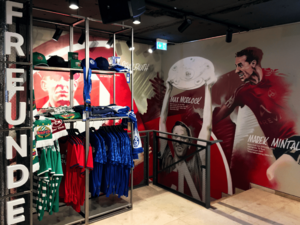
Schalke fans have friendly connections with supporters of 1. FC Nürnberg, Dutch club Twente, Vardar Skopie from North Macedonia, Spanish Club Sevilla F.C., Scottish club Heart of Midlothian, and Polish club Górnik Zabrze. The friendship with Nürnberg is the oldest connection between two fan bases in Germany. Before a match between these two clubs, their official club songs are played.
Club Songs
- Blau und weiß, wie lieb ich Dich ("Blue and White, How I Love You") is the official club song.
- Das Steigerlied, a traditional German mining song, is played before every match.
- Blau und Weiß ein Leben lang ("Blue and white a life-long") is played when a goal is scored.
- Königsblauer S04 ("Royal Blue S04") is played after every match.
Popular unofficial chants include:
- Der Mythos vom Schalker Markt ("The Myth of the Schalke Market")
- Opa Pritschikowski ("Grandpa Pritschikowski")
- Von der Emscher bis zum Bosporus ("From the Emscher to the Bosphorus")
- Wir schlugen Roda... ("We beat Roda...")
- Die Eurofighter sind wieder da ("The Eurofighter are back again")
- Für deine Farben leben und sterben wir ("For your colors we live and die")
- Wir lieben alle nur den FC Schalke ("We all love only FC Schalke")
- Wir sind die Fans ("We are the fans")
- Hurra wir sind die Schalker Knappen ("Hurray we are the Schalke Knappen")
- Kohle unter unser'n Füßen ("Coal under our feet")
- Steht auf, wenn ihr Schalker seid ("Stand up if you're Schalke"), sung to the melody of "Go West" by the Pet Shop Boys.
Revierderby
The Revierderby is the big rivalry between local clubs Schalke 04 and Borussia Dortmund. Both clubs are in the busy Ruhr region, about 30 kilometers apart. While the term can be used for any match between two football clubs from the Ruhr region, it is most often used for the rivalry between Schalke and Dortmund because of how popular and important these games are. For some fans, winning the derby is even more important than how the team performs in the Bundesliga.
Honors and Achievements
Role of honor
Domestic Titles
- Bundesliga:
- Runners-up: 1971-72, 1976-77, 2000-01, 2004-05, 2006-07, 2009-10, 2017-18
- German Championship
- Winners: 1934, 1935, 1937, 1939, 1940, 1942, 1958
- 2. Bundesliga
- Winners: 1981–82, 1990–91, 2021–22
- DFB-Pokal/German Cup
- Winners: 1937, 1971–72, 2000–01, 2001–02, 2010–11
- DFB-Ligapokal/German League Cup
- Winners: 2005
- DFL-Supercup/German Super Cup
- Winners: 2011
International Titles
- UEFA Cup
- Winners: 1996–97
- UEFA Intertoto Cup
- Winners: 2003, 2004
- Cup of the Alps
- Winners: 1968
UEFA Club Ranking
| Rank | Nation | Team | Points |
|---|---|---|---|
| 95 | Hapoel Be'er Sheva | 17,000 | |
| 96 | Royal Antwerp | 17,000 | |
| 97 | Schalke 04 | 17,000 | |
| 98 | Djurgårdens | 16,500 | |
| 99 | Sivasspor | 16,500 |
Youth Titles
Domestic
- Under 19 Bundesliga
- Winners: 1976, 2006, 2012, 2015
- Runners-up: 1975, 1980, 1981
- Under 19 Bundesliga West
- Winners: 2006, 2012, 2013, 2014, 2015
- Under 17 Bundesliga
- Winners: 1978, 2002
- Runners-up: 1977, 1980
- Under 17 Bundesliga West
- Winners: 2013
Double Wins
- 1937: Championship and Cup
Coaches and Management
Notable Coaches
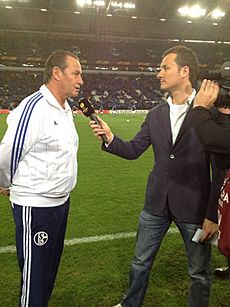
| Name | Nationality | From | To | Honours |
|---|---|---|---|---|
| Hans Schmidt | 1 July 1933 | 12 June 1938 | 3 German championships (1934, 1935, 1937) German championship runners-up (1933, 1938) 5 Gauliga Westfalen championships (1934, 1935, 1936, 1937, 1938) 1 Tschammerpokal (1937); runners-up (1935, 1936) |
|
| Otto Faist | 13 July 1938 | 31 December 1942 | 3 German championships (1939, 1940, 1942) German championship runners-up (1941) 4 Gauliga Westfalen championships (1939, 1940, 1941, 1942) Tschammerpokal runners-up (1941, 1942) |
|
| Ernst Kuzorra | 1 July 1946 | 30 September 1947 | ||
| Fritz Szepan | 1 July 1949 | 30 June 1954 | 1 Oberliga West championship (1951); runners-up (1952) | |
| Edi Frühwirth | 1 July 1954 | 30 June 1959 | 1 German championship (1958) 1 Oberliga West championship (1958); runners-up (1956) DFB-Pokal runners-up (1955) |
|
| Ivica Horvat | 1 July 1971 1 July 1978 |
30 June 1976 17 March 1979 |
Bundesliga runners-up (1971–72) 1 DFB-Pokal (1971–72) |
|
| Huub Stevens | 8 October 1996 27 September 2011 14 March 2019 18 December 2020 |
30 June 2002 16 December 2012 30 June 2019 22 December 2020 |
Bundesliga runners-up (2000–01) 2 DFB-Pokals (2000–01, 2001–02) 1 UEFA Cup (1997) DFB-Ligapokal runners-up (2001, 2002) |
|
| Felix Magath | 1 July 2009 | 16 March 2011 | Bundesliga runners-up (2009–10) 1 DFL-Supercup (2010) |
Other Sports Departments
The basketball department played in Germany's top basketball league in 1988–89 and in the second-highest league from 2004 for several seasons. In 2009, Schalke 04 voluntarily left the second league. Currently, the team competes in the ProB league. The club started a blind football department in 2015, which plays in the Blindenfußball-Bundesliga.
The women's football club was stopped in the mid-1980s but had achieved some notable successes, including five Westphalia championships. They also competed in the German championship and German Cup. Schalke 04 later worked with another women's football club from 2007 to 2010. The current women's team was started in July 2020 to compete in Kreisliga B, the eighth level of women's football, in 2021.
Other long-standing departments include the handball department, founded in 1926, which competed in top divisions. The athletics department was founded in 1922. Famous former players include Olympic silver medalist decathlete Frank Busemann and 2003 European Athletics Junior Championships gold 200-metre runner, Sebastian Ernst. The table tennis department was founded in 1947 and competes in the Westphalia district league. The women's team was one of the early participants in the national league until it withdrew in 1956.
In 2016, Schalke bought the League of Legends e-sports team Elements. This made them the second professional sports team with a League of Legends division. In early June, they started playing in the European League of Legends Championship Series, the top level of professional League of Legends competition in Europe. The club also announced Tim Reichert as Head of ESport.
See also
 In Spanish: FC Schalke 04 para niños
In Spanish: FC Schalke 04 para niños
- The Football Club Social Alliance
- Forbes' list of the most valuable football clubs


